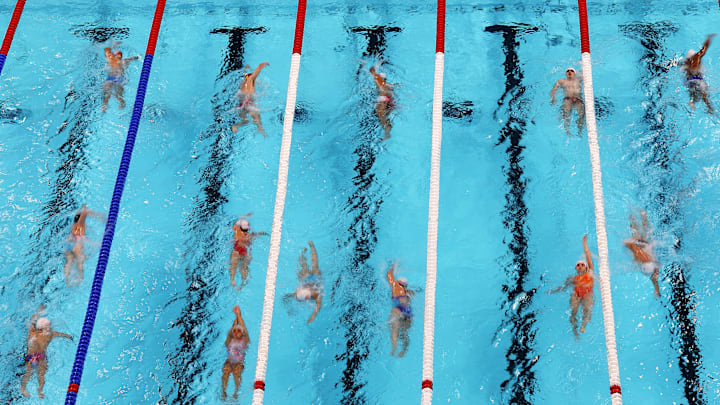Competitive swimming is no joke. It takes a combination of strength, agility, and technique to be successful in the field. It's evident that athletes work hard, but there's another factor that goes into their achievements. At the Olympics—including the 2024 games in Paris—state-of-the-art pools called fast pools also contribute to a swimmer’s performance, with features that help them gain optimal speed.
According to NBC News, a fast pool is built to mitigate factors that slow swimmers down. With all that kicking and stroking, waves are the main culprits. Therefore, engineers design fast pools with components that minimize the water's movement. The video below shows the fast pool used in the 2012 Summer Olympics in London.
Most pools used for competitions are around 10 feet deep. At that depth, any water the swimmers kick down will lose energy and dissipate before reaching the pool's floor. If the water is too shallow, waves will bounce off the bottom of the pool and back up to the athletes, hindering them from reaching full speed.
The ingenuity doesn’t stop there. Designers also consider the edges and lane divisions of fast pools. Troughs along the ends and sides of the structure eliminate waves by absorbing their energy, preventing them from rebounding back into the athletes' lanes. Additionally, when waves hit lane lines, the water spins around them rather than passing through them. This stops one swimmer's waves from disturbing their competitors in the other lanes.
The temperature of the pool water also matters. If the pool water is too cold, an athlete’s muscles can tighten up. On the other hand, hot water can cause muscles to relax too much. For maximum performance, the mandated temperature for Olympic swimming events is between 77 and 82°F.
Though it's still considered a fast pool, the pool at the Paris Olympics is more shallow than most Olympic facilities, with a depth barely exceeding 7 feet. This hasn't stopped swimmers from excelling at the summer games. Caeleb Dressel, also known as the fastest swimmer in the world, earned his eighth golden medal for the U.S. in the opening days of the event. That ties him for the sixth-most medals earned by any athlete since the modern Olympics began.
Read More About the Olympics:
